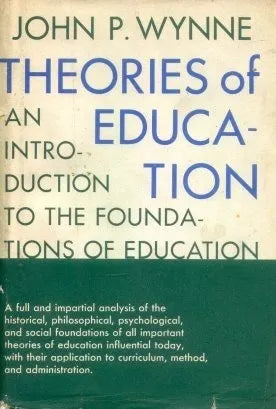LIBRO USADO
Theories of education – John P. Wynne – HarperCollins – 1963 – Dura
1 en existencias
No se pudo cargar la disponibilidad de retiro
Título: Theories of education
Autor: John P. Wynne
Edición: 1963
Editorial: HarperCollins
Estado del libro: Muy Bueno
Medidas: 15 x 21,4 cm
Colección: Harper & Row
Encuadernación: Dura
Páginas 521
Peso: 800 gramos
Género del libro: Idioma - Ingles
Idioma del libro: Ingles
Isbn10: -
Isbn13: -
Compartir en redes




Descripcion del libro:
**Theories of education**: Theories of education: An introduction to the foundations of education.
"Those who are acquainted with the field of educational philosophy are well aware of the scholarly solidity of the writings of Dr. John P. Wynne. He has long been a recognized authority in the field, and the present book will enhance his standing. It is the product of lifelong experience, of deep study, of lifelong experience, of deep study, and of extended labor. Writing and rewriting have preceded publication.
This, the final product, is the distillation of a lifetime an astutely perceptive presentation and appraisal of today's thinking on the ends, ways, and means of the American educational enterprise.
"Dr. Wynne's treatment, however, has not been limited to presentation and appraisal. It includes also background and foreground for each proposal cultural conditions, philosophic presuppositions, and logical impliations in terms of educational practice. The author's first concern is always authentic portrayal to present each view as sympathetically as would a proponent. To that end he has wherever possible submitted his treatment of each philosophy to a leading representative of the view under consideration, for criticism and corrective suggestions. Hence, this book is one of the best available means, short of recourse to original sources, for becoming acquainted with extant educational philosophies.
"Although there are other books some fairly recent that try to serve the some purpose as this one, the distinctiveness of this book would seem to be (1) its extensive and systematic coverage of the field, (2) its adequacy of treatment of each view, (3) its inclusion of the findings of many recent studies, particularly of older views, and (4) its avoidance of subservience to the author's own synthesis. Complete "objectivity" is not claimed, for the author does not assume that to be possible; but, by letting his own views stand as portrayed elsewhere, the author avoids the effect of overshadowing that would be hardly avoidable otherwise."
The Editor's Foreword, Ernest E. Bayles.




